高二英语选修7第4单元课件(M7U4)[下学期]
文档属性
| 名称 | 高二英语选修7第4单元课件(M7U4)[下学期] |

|
|
| 格式 | rar | ||
| 文件大小 | 7.7MB | ||
| 资源类型 | 教案 | ||
| 版本资源 | 通用版 | ||
| 科目 | 英语 | ||
| 更新时间 | 2007-03-08 00:00:00 | ||
图片预览

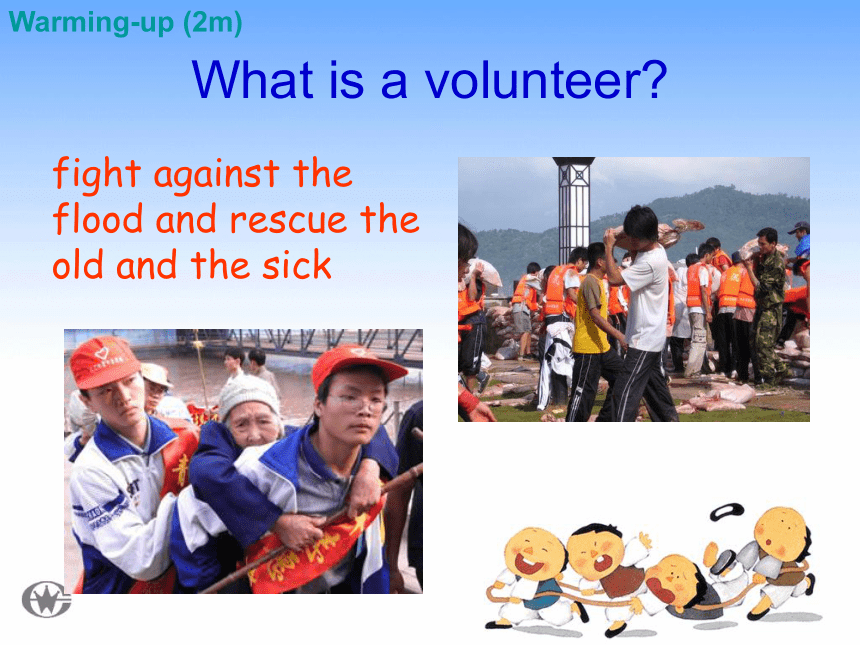
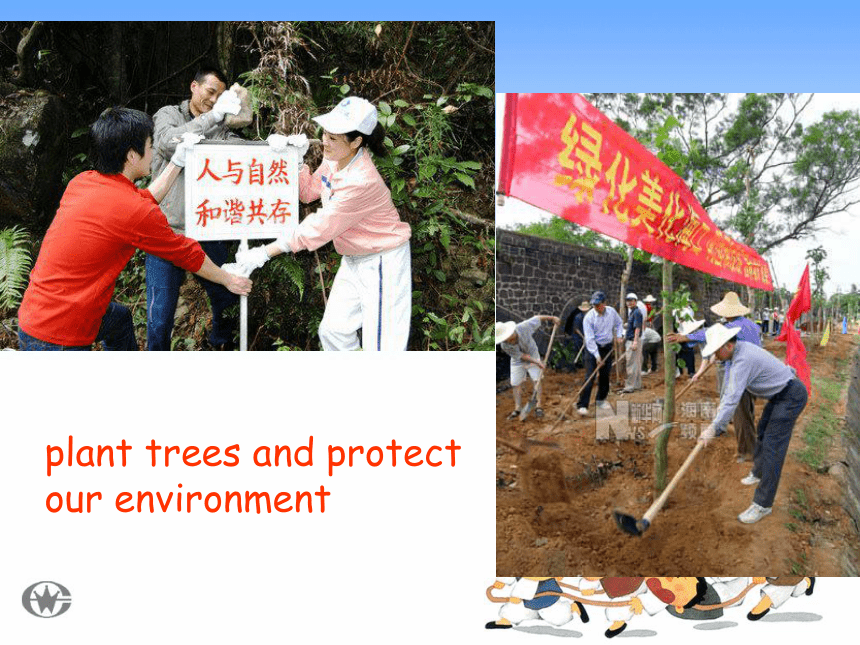
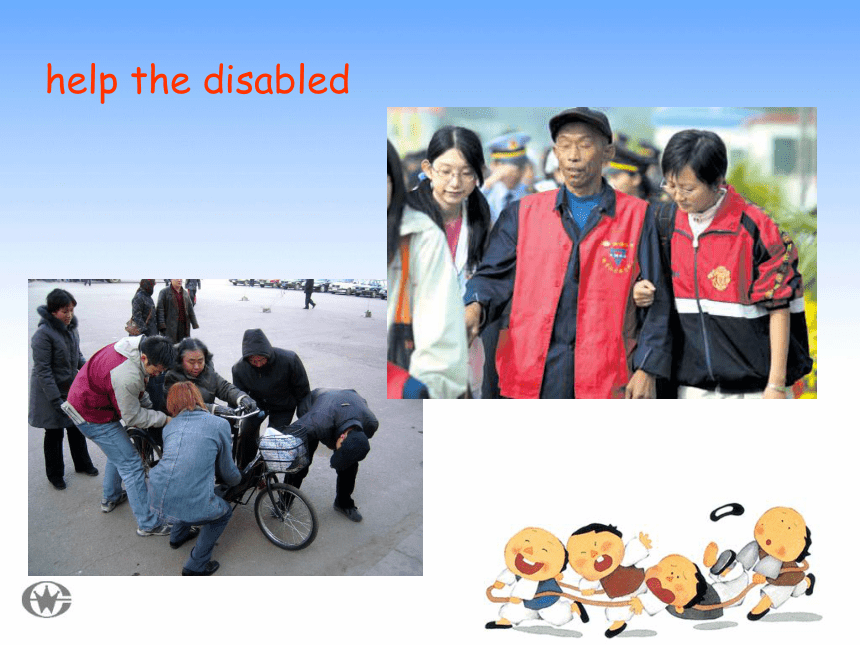
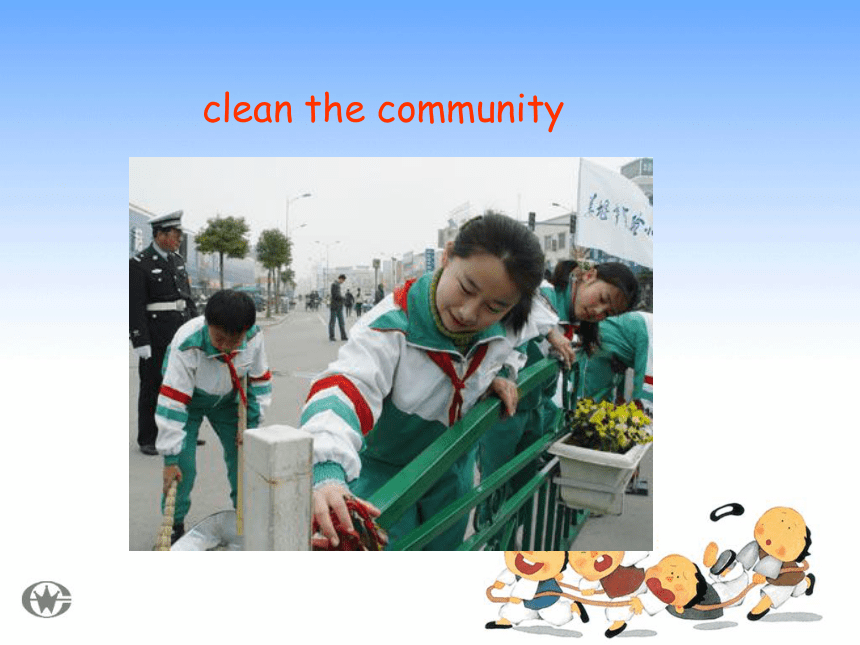
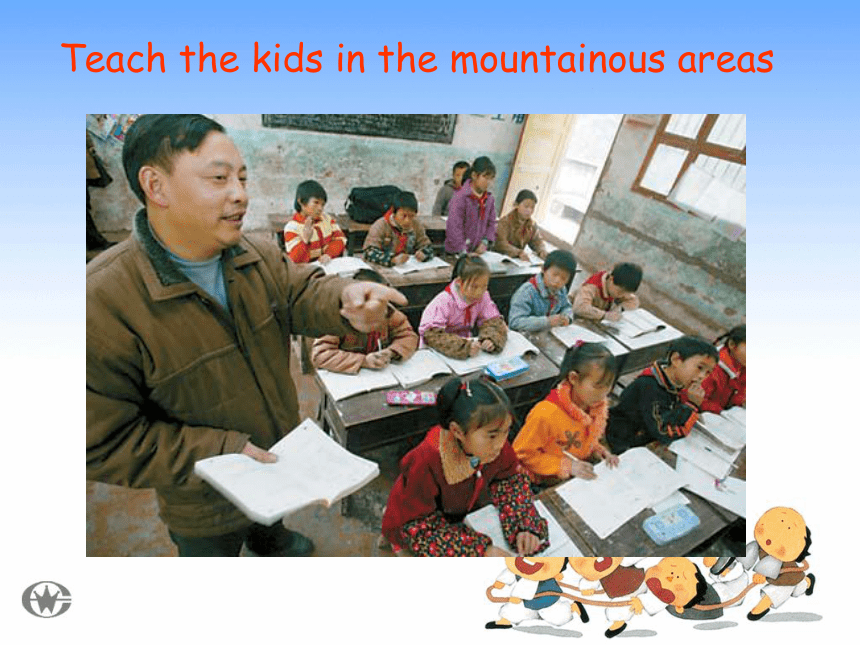
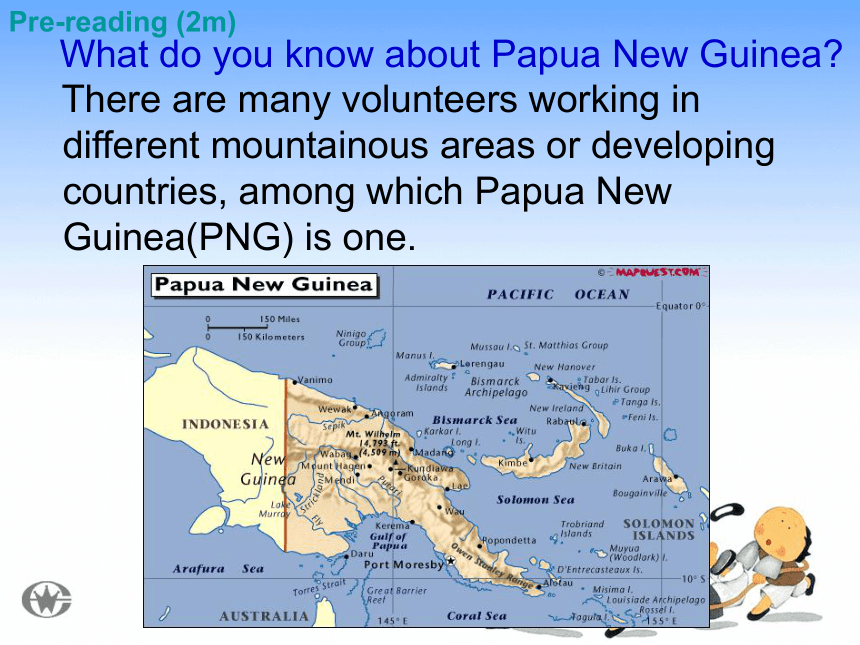
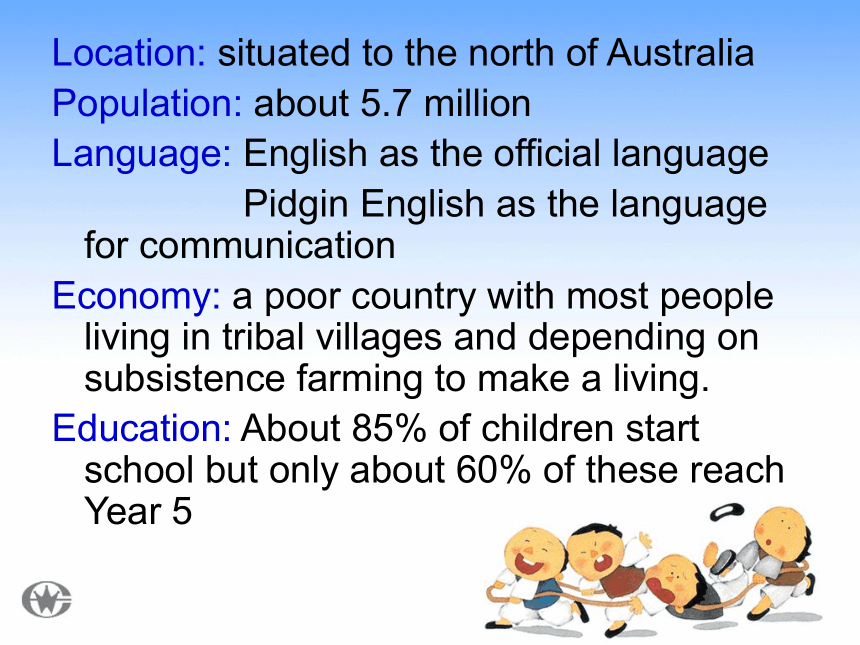

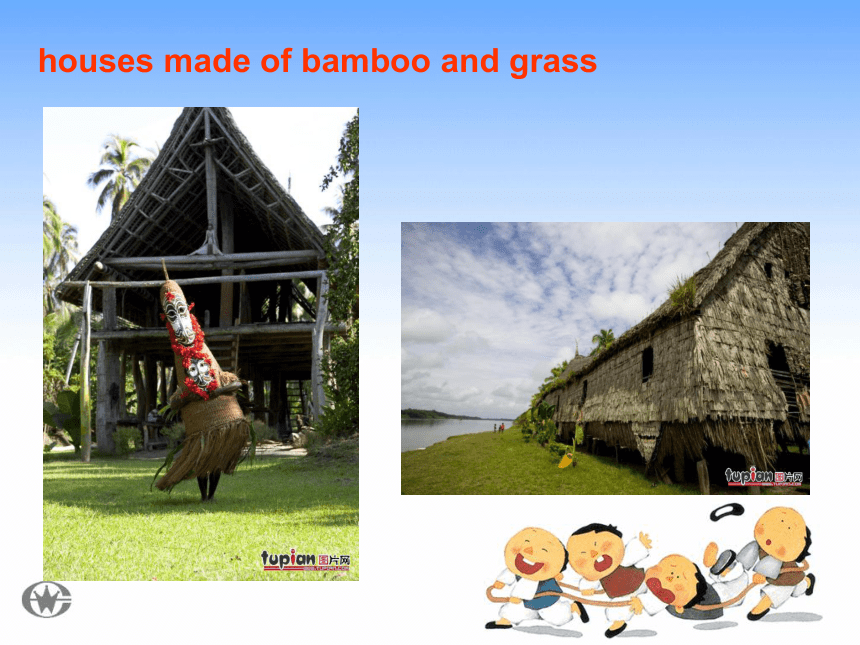
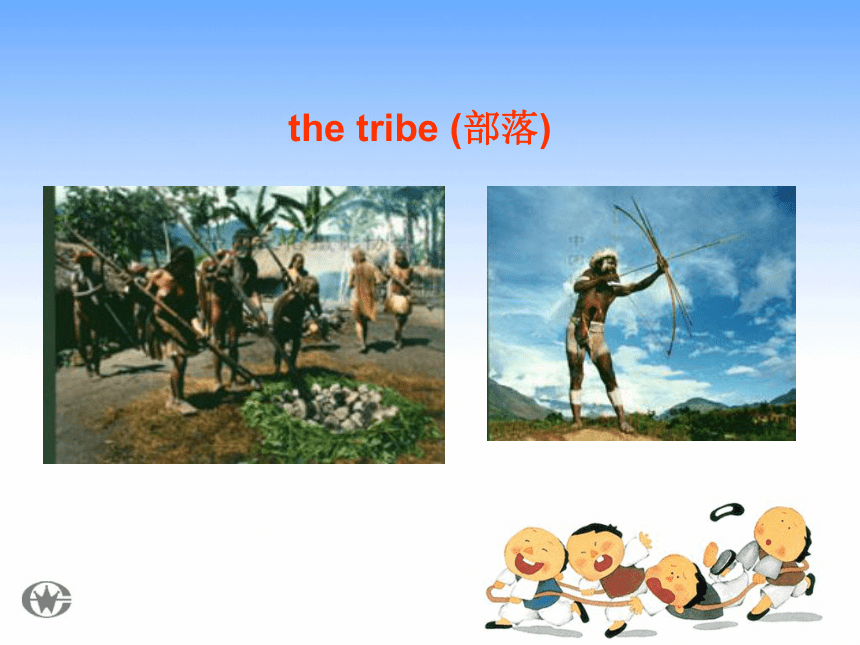
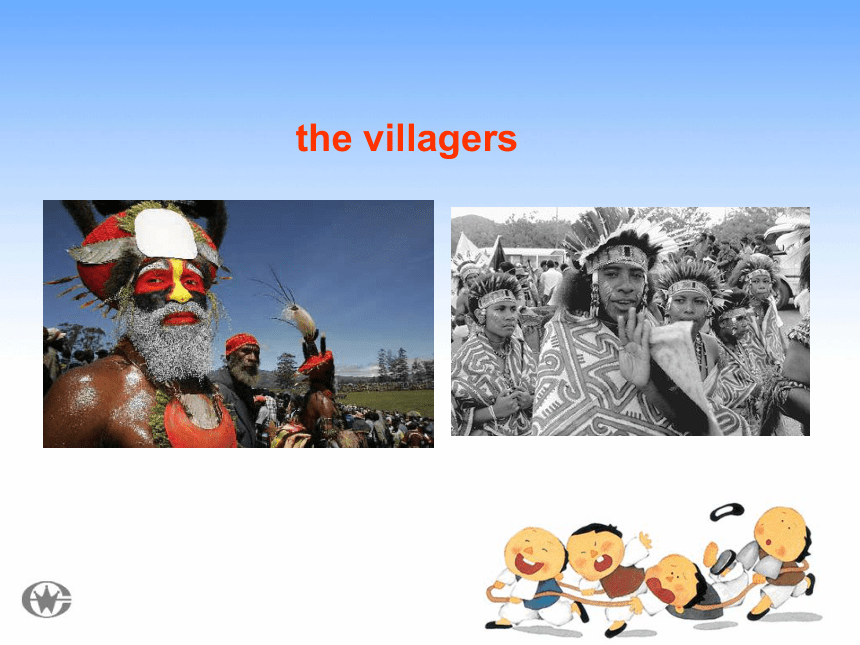
文档简介
课件125张PPT。Period 1&2: 幻灯片9-40页Period 1&2 Warming
up and Reading IUnit 4 SharingWhat is a volunteer?Warming-up (2m)fight against the flood and rescue the old and the sickplant trees and protect our environmenthelp the disabledclean the communityTeach the kids in the mountainous areasWhat do you know about Papua New Guinea? There are many volunteers working in different mountainous areas or developing countries, among which Papua New Guinea(PNG) is one. Pre-reading (2m)Location: situated to the north of Australia
Population: about 5.7 million
Language: English as the official language
Pidgin English as the language for communication
Economy: a poor country with most people living in tribal villages and depending on subsistence farming to make a living.
Education: About 85% of children start school but only about 60% of these reach Year 5PNG’s national flag and national emblem(国徽)
PNG’s paper currencyhouses made of bamboo and grassthe tribe (部落)the villagersJo was a volunteer worked in Papua New Guinea (PNG) for two years.
The following photos were taken by Jo in PNG. Look at the photos and answer the questions.Pre-reading (2m)What was Jo’s job in PNG?
What kind of students were in her class?
Describe the classrooms.What can you say about the village?
What can you say about life in the village?What was Jo’s job in PNG?
What is the letter mainly about?Reading-I----skimming (2m)Jo was a volunteer teacher in PNGIt’a about Jo’s experience as a volunteer teacher and her first visit to a village in PNG.Skim the text for 2 minutes and answer the following questions.Read paragraph 1-3 and finish the questions
Why does Jo call the high school a “bush school”
Were the boys friendly to Jo? How do you know?
How long does it take the students to go to school?
Why was science the most challenging subject for Jo?
Why did the boys start jumping out of the windows?
Why does Jo wonder how relevant chemistry is to the kids?
Reading-II----detailed reading (4m)Read paragraph 1-3 and finish the questions
Why does Jo call the high school a “bush school”
Were the boys friendly to Jo? How do you know?
How long does it take the students to go to school?
Because the classrooms are made from bamboo and the roofs from grass.Sometimes up to 2 hoursThere are a lot of “good mornings” for Jo from the boys.Why was science the most challenging subject for Jo?
Why did the boys start jumping out of the windows?
Why does Jo wonder how relevant chemistry is to the kids?
Because most of the boys will go back to their villages after year 8 and she thinks chemistry may make little difference to the kids’ life.There was no equipment.The boys never came across anything like the bubbling mixture.Read Paragraph 4-7 and finish the chartReading-II----detailed reading (5m)low bamboo hutgrass sticking out of the roofwindowsdoorwayfresh grassrelativeHot stonesoil drumvegetablesbanana leavessteamedown hutplatformsweet potatocornsgreenstin platescupspotsmachineryleftoversevil spiritsdried upthrown outdiscussion (5m)What do you think are the positive and negative things about living in a village in Papua New Guinea. Discuss with your partner and list the positive and negative things as many as possible.Living in a village is good or bad?speaking (5m)Would you like to work as
a volunteer in a poor area?Homework Surf the Internet to find some information about the volunteers working in poor areas.Language points for reading ITake a break!Period 3 Learning
about languageUnit 4 SharingPeriod 3: 幻灯片41-61页Ex. 1 on page 32adjust
grill
relevant
doorway
privilege
arrangementcheck the exercise (5m)Ex. 2 on page 32 Sharon looked at herself in the mirror and sighed. Her hair was ___________ all over the place. She smoothed it down with a wet comb. She thought about the time when she had met him three months before. He was the nicest boy she had ever ____________. He had rung her often but now she hadn’t __________ him for two weeks. Why not? She decided to find out. She walked down to the ________ to catch the train. She felt both excited and nervous. She was __________ see him again but what if he didn’t want to see her?dying tocome acrossheard fromplatformsticking out 定语从句复习 在复合句中修饰名词或代词的从句叫做定语从句。别修饰的名词或代词叫先行词。引导定语从句的关系代词有:which, that, who, whom, whose。引导英语从句的关系副词有:where, when, why。 注:1.介词提前时一般只用which和whom。
2.whose+名词=the+名词+of which/ of whom宜用that引导的定语从句
1)序数词或最高级形容词修饰先行词时,要用that。
The first English novel that I read was A Tale of Two Cities by Charles Dickens.
all, everything, nothing, something, anything 等不定代词作先行词时用that。
Everything that we saw in the factory greatly interested us.
先行词有两个,既有人也有物,要用that。
We were talking about the persons and things that we remembered in our school.
先行词前有the only, the very, the right等修饰时,要用that。
It is the very skirt that suits me well.(2)宜用which引导的定语从句
当定语从句的借此提前时,要用which。
The house in which they lived last year has been rebuilt.
引导非限制性定语从句时,要用which。
He bought a railway ticket for the woman, which helped her a lot.(3)宜用as引导的定语从句
先行词与such, the same连用或先行词本身就是the same, such时,要用as。
Such people as you describe are rare nowadays.
Would you like to buy the same pen as I have?
2) 代替整个句子,在从句中作主语,而从句位于句首时,要用as。
As is well known, the earth goes around the sun.(4) 宜用who引导的定语从句。
当先行词是人称代词或是those, anyone等时,常用who。
He who does not reach the Great Wall is not a true man.
Those who were either fools or unfit for their offices could not see the cloth.I have many friends, __________ some are businessmen.
A. of them B. from which
C. who of D. of whom高考链接D解析:答案D。考查介词+关系代词2. The doctor advised Vera strongly that she should take a holiday, but __________ didn’t help.
A. which B. it
C. she D. he高考链接B解析:答案B。此句不是考试定语从句,而是一个并列句。and连接两个句子。it指代前一句的内容。If a shop has chairs ________ women can park their men, women will spend more time in the shop.
A. that B. which
C. when D. where高考链接D解析:答案D。先行词chairs在定语从句中作状语,用where。----Why does she always ask you for help?
----There is no one else ______, is there?
A. who to turn to B. she can turn to
C. for whom to turn D. for her to turn 高考链接B解析:答案B。one是先行词,省略了关系代词that。5. Many people who had seen the film were afraid to go to the forest when they remembered the scenes ________ people were eaten by the tiger.
A. in which B. by which
C. which D. that高考链接A解析:答案A。该题考查定语从句介词+关系代词。6. Do you still remember the chicken farm _______ we visited three months ago?
A. in which B. by which
C. which D. that高考链接C解析:答案C。先行词farm在从句中作visit的宾语。7. The journey around the world took the old sailor nine months, ________ the sailing time was 226 days.
A. of which B. during which
C. from which D. for which高考链接A解析:答案A。该题考查定语从句介词+关系代词。8. There were dirty marks on her trousers ______ she had wiped her hands.
A. where B. which
C. when D. that高考链接A解析:答案A。先行词her trousers在定语从句中作状语,故用关系副词where。9. ________ is reported in the newspaper, talks between the two countries are making progress.
A. It B. As
C. That D. What高考链接B解析:答案B。代替整个句子,在从句中作主语,而从句位于句首时,要用as。10.Is this the only reason ______ at the meeting for his carelessness in his work?
A. that he explained B. what he explained
C. why he explained D. which he explained高考链接A解析:答案A。先行词前有the only, the very, the right等修饰时,要用that。
Homework Summarize the rules of attributive clauseTake a break!Period 4 Reading IIUnit 4 SharingPeriod 4: 幻灯片62-90页 Have you ever tried to send a gift or something to the children in the poor areas or countries? Pre-reading (5m)http://www.tear.org.au/giftcatalogue/index.shtml Welcome to the World’s Most Useful Gift Catalogue, arguably the most practical response to global poverty and over-consumption.
Do you ever feel that your friends and family don’t really need the gifts you give them? Or, are you sick of receiving ‘novelty’ gifts, when you know that so many people go without? This catalogue is full of really useful gifts for people who really need them. People who work hard to overcome poverty, to build a better life for their families and their neighbours.
So if you’re after platters, popcorn makers and picnic sets – try another catalogue. But if you want gifts like books for a community school ($5), a goat for a family ($50), or health care for a remote village ($60), then this catalogue is for you!What does the page show you?
Where is the list of gifts?
In what kind of order are the gifts listed? How much are cheapest and dearest gift?
Where is the gift card?
What do the photos show you?Fast reading (2m)Glance quickly at the text and answer the following questions.1. What does the page show you?
The page shows how to send gifts to those who need it.
2. Where is the list of gifts?
On the left side of the page below the picture with a man in it. 3. In what kind of order are the gifts listed? How much are cheapest and dearest gift?
The gifts are listed in order of the prices.
4. Where is the gift card?
On the right side of the page over the picture with a lot of children in it. 5. What do the photos show you?
The picture on the left shows a woman working on a sewing machine. The one on the right shows that many children are waiting for help to come to them.1. In the Internet pages, there’s a card on the right, it will be given to you when you____
A. buy something in a shop
B. ask for it from a poor children
C. choose from the catalogue a really useful gift for some of the world’s poorest
D. come to IndiaDetailed reading (5m)Read the text carefully and do the following exercise.C2. When you want to give child vaccinations against 6 killer diseases, you must send _____
$50 B. $20
$8 D. $85
3. The purpose of the Internet Page is to ____
let people give an unusual gift to the poor
let people get an unusual card
let people learn something useful
let people make moneyBA4. How much are the cheapest and dearest gifts?
$ 8 B. $ 10
$ 15 D. $ 5
5. You can use the card for the following occasions except _______
anniversaries B. birthdays
C. burials D. weddingsDCThis gift allows a woman who is a trained tailor to make some income, giving her and her family a better future.
This gift gives a man or a woman the opportunity to acquire basic reading and writing, and life skills. Adults develop the confidence to participate in the social, economic and political lives of their communities. Detailed reading (5m)On the Internet page, when you click on each gift, you get a description of that gift. In pairs, write the correct gift (A to U)from the Internet page next to each description below.N A sewing machineG Basic adult educationThis gift covers the cost of production and distribution of seedlings, as well as training in tree care for the local villagers who are working hard to prevent their land from turning into desert.
This gift buys a goat. A goat gives milk and is a valuable income. Goats increase in number quickly and add much to a family’s food and financial security. They are easy and fun for children to care for.
A 20 tree seedlingsJ A goat for a poor familyThis gift covers the cost of exercise books and textbooks for community primary schools that operate in poor or remote villages.
This gift gives a child a good start in life. Community schools provide good quality education for children who would otherwise have no opportunity to attend school. F Basic health-care servicesI One year of primary schooling Imagine you and your classmates want to donate some of your pocket money to help those in need in another country. Work as a team and decide how much of your pocket money you would like to donate. What would you do with your group’s donation? Do you think the gifts like those in “The World’s Most Useful Catalogue” are a good idea? Give at least two reasons for your answers.Discussion (5m)Homework Surf the Internet to find more information gift catalogue.Language points for reading IITake a break!Period 5 ListeningUnit 4 SharingPeriod 5: 幻灯片91-108页http://www.msf.org/Medecins Sans Frontieres (MSF)
= doctors without borders (MSF) is an international humanitarian aid organisation that provides emergency medical assistance to populations in danger in more than
70 countries. objectives:
MSF is an independent humanitarian medical aid agency committed to two objectives: providing medical aid wherever needed, regardless of race, religion, politics or sex and raising awareness of the plight(困境,情况) of the people we help.
( ) in 1997 ( ) over the last few years
( ) in 1990 ( ) for six more months
( ) in the future ( ) in the 1980s
( ) for two weeks ( ) in 1992
( ) in 2001 ( ) in two weeks’ time
( ) for a couple of monthsListening-I (5m)In the listening, Jennifer Wells interviews Dr Mary Murray, a volunteer with Medicines Sans Frontieres (MSF). They use time expressions to talk about what has happened in Mary’s life. Listen to these expressions and number them in the order you hear them.1234567891011Why did Mary decide to work in developing countries?
When Mary worked in a clinic in Malawi, why did the children die?
In the Sudan, why was it nearly impossible for Mary to get to the clinics when the rains came?
Why were conditions in the clinics in the Sudan challenging?
What was one of the effects of Mary’s experiences on her?Listening-II (5m)Listen to the tape again and answer the following questions.Why did Mary decide to work in developing countries?
When Mary worked in a clinic in Malawi, why did the children die?
Because when she worked in an African health clinic, she saw children with illnesses that could be prevented.Because they didn’t have enough medicines.In the Sudan, why was it nearly impossible for Mary to get to the clinics when the rains came?
Why were conditions in the clinics in the Sudan challenging?
Because the roads became so muddy that they spent most of their days digging the car out.Because it could be very hot; it could be nearly impossible to get to the clinics when it rained; the clinics were very basic and the only tools she had were a stethoscope and her hands.What was one of the effects of Mary’s experiences on her?
She now has a much greater appreciation of life and what other people have to go through.Listening-III (5m)Listen again and make note about Mary’s experiences in the table below.Speaking (5m)With a partner, take turns to tell each other about Dr Mary Murray. Use the information you have collected from the previous two exercises. Remember to use time expressions.Homework Retell the story of Dr Mary MurrayTake a break!Period 6 Speaking
and writingUnit 4 SharingPeriod 6: 幻灯片109-124页Speaking taskProject Hope Project Hope is a social welfare programme founded by China Youth Development Foundation. Its aim is to raise money to help those children in poor areas who have to leave school early only because their families cannot afford to keep them at school.大眼睛大鼻涕Why would you …?
How could you do that?
Because I want to share with others …
First, find some information through …
The reason is that …Then …Next … Finally …Discuss in groups whether you would like to participate in Project Hope by sponsoring a child from a poor area. Give reasons to your answer. If you decided to sponsor a child, how would you do it? You may refer to the following expressions.Speaking (10m) Shanshan is a 11-year-old girl from Gansu Province whose family cannot afford to keep her at school. You have just decided to sponsor her. Shanshan loves practising English. Write a short letter to her in English. The following points should be included in your letter.Writing (20m)Hello Shanshan,
___________________
___________________
___________________
___________________
___________________
___________________
___________________
___________________
Yours sincerely,
_____________Introduce yourself.Say something about yourself and the things you like doing.Describe your family.Let her know you would like to hear from her.Sign your name.A writing sample
Hello Shanshan,
I’m a student of Qin Huangdao No. 1 Senior High School, Hebei Province. My English name is Steve, and I like English very much. Maybe I can help you to continue with your school.
I go to school every day except on Sundays. Every morning, we have four lessons, including P.E., arts, Music. I like sports very much, especially football. Whenever I’m free I would play football with my classmates. I also enjoy reading English papers, which gave me great delight, and improve my studies.
I have a small family. There are Father, Mother and I. Mum often cooks delicious food me. And Dad usually encourages me to study harder in order to serve the country and people better. I think so. So I work very hard a my lessons.
I’m looking forward to hearing from you. I want to know what you need badly so that I know what I can do for you. Don’t hesitate to ask for what you want. I will try to help you.
Yours sincerely,
Yang Xiaoping
Homework Revise your writing.Take a break!Language points for Reading I
Language points for Reading II
Video dataLanguage Data Bank1. Thanks for your letter. It was wonderful to hear from you.
hear from sb. = receive a letter from sb. 收到某人的信
I look forward to hearing from you.
注意:hear from后面只能接表示人的名词或代词,不可接letter作为它的宾语。
hear about 听说……的事
Have you heard about the new anticancer drug?
hear of 听说
Who's he?--I've never heard of him. 他是谁?──我从没听说过他。
Language points for Reading I2. I know you’re dying to hear all about my life here.
be dying to do / for sth. 渴望做某事;迫切想要
She is dying to go abroad.
I am dying for a glass of water.
“渴望”的类似说法
be thirty for sth.
desire to do sth.
have a strong desire for sth.
long to do for sth.
3. …have walked a long way, sometimes up to two hours, to get to the school.
up to = as many as/ as much as
He can earn up to $50,000 a year.
up to 还可以表示
(1) up until 一直
She lived at home right up to / until she got married.
(2) good enough for sth. 胜任
I am not sure if she is really up to that job.
(3)由……负责
It’s up to her to decide whether or not to go on the course.
4. I’m still trying to adapt to these conditions but, one thing is …
adapt (oneself) to 适应,适合
We have had to adapt quickly to the new system.
When you go to a new country, you must adapt yourself to new manners and customs.
注意:adapt (oneself) to 的to是介词,后跟名词或动词-ing形式。类似的词组有: be used to 习惯于
be related to 与……相关
lead to 导致/通向
devote oneself to 献身于
contribute to 为……作贡献
access to 接近/进入(某地的)方法
look forward to 盼望
pay attention to 注意
give rise to 引起
be accustomed to 习惯于
be addicted to 沉溺于
5. The boys had never come across anything like this.
come across 偶然遇见/发现
I came across some interesting books in the room.
I came across an old friend I hadn’t seen for years.
come about 发生
This situation should never have come about.
come along 进展
How is your work come along?
6. In fact, I wonder whether I’m making any difference to these boys’ lives at all.
make a difference 有关系,有影响, 起(重要)作用
Dollars make no difference to him.
I don’t think it will make any difference.
wonder 用法归纳
wonder wh-词 + to do 想知道……
wonder wh- / if + 从句 想知道……
I was wondering where to spend the weekend.
I wonder if you are free this afternoon.
It’s no wonder + (that) 从句 难怪,怪不得,不足为奇
No wonder that he has passed the examination.
7. Tombe’s father, Mukap, led us to his house, a low bamboo hut with grass sticking out of the roof.
stick out 伸出
She stick out her foot and tripped him over.
她伸出脚把他绊倒。
8. The hut was dark inside so it took time for our eyes to adjust.
adjust vi. 适应
He adjusted quickly to the heat of India.
adjust vt. 调整
He adjusted his tie before entering the hall.
adjustable adj.可调整的
adjustment n.调整
9. Tombe told me that the can was heated to dry out the leftover food. They believe that any leftovers attract evil spirits in the night so the food is dried up in the can.
dry out (使)变干,干透
Water the plant regularly, never letting the soil dry out.
dry up (河流,湖泊等)干枯,(使)完全变干
During the drought the river dried up.
The writer’s long separation from social dried up his imagination.10. It was such a privilege to have spent a day with Tombe’s family.
privilege 殊荣
It was a privilege to make his acquaintance. 能认识他真是荣幸之至。
privilege 还表示“特权”、“权利”
Only members have the privilege to use the ground.
the privilege of citizenship/ equality 公民权/平等权
ox 公牛,它的复数形式是oxen。
名词复数形式的特殊变化:
1) 单复数同形:sheep, fish, deer, cattle (牲口牛), staff (全体职员), means (方法), crew(全体工作人员)
2) 一般情况下,以o结尾的名词,其复数形式是加s, 但tomato, potato, hero 和 Negro则在它们后面加-es,构成复数。Language points for Reading II 3) 以-f, -fe结尾的名词,有两种情况。一种是直接在这些名词后-s,如:roof-roofs (屋顶), chief-chiefs (首领), serf-serfs(农奴), belief-beliefs (信念), proof-proofs (证据)。另一种是把-f, -fe改成-ves,如:knife-knives; wife-wives; life-lives。
4) 单复数形式变化特殊,如:datum-data(数据,资料), phenomenon-phenomena (现象), child-children, mouse-mice
2. participate (+in) vi. 参加,参与
participation n.参与
participant n. 参与者
She didn’t participate in the discussion.
Children are encouraged to participate in the lives of their communities.
人们鼓励孩子们参与社团活动。
finance (for sth.) n. 资金;财政;金融
financial adj.财政的, 金融的
finance v. 给……提供资金
Finance for education comes from taxpayers. 教育经费来自纳税人。
the Minister of Finance 财政部长
London is a financial centre. 伦敦是个金融中心。
The building project will be financed by the government and public donations. 这个建筑项目将由政府出资以及公众捐款。
4. Choose from this catalogue a really useful gift for some of the world’s poorest and bring hope for a better future to a community in need.
in need 在困难中,在危机中
We are collecting money for families in need.
我们正在为有困难的家庭募捐。
There’s no need for sb. to do sth. 没必要做某事
There’s no need for you to come if you don’t want to.
如果你不想来,就不必来。 The End
up and Reading IUnit 4 SharingWhat is a volunteer?Warming-up (2m)fight against the flood and rescue the old and the sickplant trees and protect our environmenthelp the disabledclean the communityTeach the kids in the mountainous areasWhat do you know about Papua New Guinea? There are many volunteers working in different mountainous areas or developing countries, among which Papua New Guinea(PNG) is one. Pre-reading (2m)Location: situated to the north of Australia
Population: about 5.7 million
Language: English as the official language
Pidgin English as the language for communication
Economy: a poor country with most people living in tribal villages and depending on subsistence farming to make a living.
Education: About 85% of children start school but only about 60% of these reach Year 5PNG’s national flag and national emblem(国徽)
PNG’s paper currencyhouses made of bamboo and grassthe tribe (部落)the villagersJo was a volunteer worked in Papua New Guinea (PNG) for two years.
The following photos were taken by Jo in PNG. Look at the photos and answer the questions.Pre-reading (2m)What was Jo’s job in PNG?
What kind of students were in her class?
Describe the classrooms.What can you say about the village?
What can you say about life in the village?What was Jo’s job in PNG?
What is the letter mainly about?Reading-I----skimming (2m)Jo was a volunteer teacher in PNGIt’a about Jo’s experience as a volunteer teacher and her first visit to a village in PNG.Skim the text for 2 minutes and answer the following questions.Read paragraph 1-3 and finish the questions
Why does Jo call the high school a “bush school”
Were the boys friendly to Jo? How do you know?
How long does it take the students to go to school?
Why was science the most challenging subject for Jo?
Why did the boys start jumping out of the windows?
Why does Jo wonder how relevant chemistry is to the kids?
Reading-II----detailed reading (4m)Read paragraph 1-3 and finish the questions
Why does Jo call the high school a “bush school”
Were the boys friendly to Jo? How do you know?
How long does it take the students to go to school?
Because the classrooms are made from bamboo and the roofs from grass.Sometimes up to 2 hoursThere are a lot of “good mornings” for Jo from the boys.Why was science the most challenging subject for Jo?
Why did the boys start jumping out of the windows?
Why does Jo wonder how relevant chemistry is to the kids?
Because most of the boys will go back to their villages after year 8 and she thinks chemistry may make little difference to the kids’ life.There was no equipment.The boys never came across anything like the bubbling mixture.Read Paragraph 4-7 and finish the chartReading-II----detailed reading (5m)low bamboo hutgrass sticking out of the roofwindowsdoorwayfresh grassrelativeHot stonesoil drumvegetablesbanana leavessteamedown hutplatformsweet potatocornsgreenstin platescupspotsmachineryleftoversevil spiritsdried upthrown outdiscussion (5m)What do you think are the positive and negative things about living in a village in Papua New Guinea. Discuss with your partner and list the positive and negative things as many as possible.Living in a village is good or bad?speaking (5m)Would you like to work as
a volunteer in a poor area?Homework Surf the Internet to find some information about the volunteers working in poor areas.Language points for reading ITake a break!Period 3 Learning
about languageUnit 4 SharingPeriod 3: 幻灯片41-61页Ex. 1 on page 32adjust
grill
relevant
doorway
privilege
arrangementcheck the exercise (5m)Ex. 2 on page 32 Sharon looked at herself in the mirror and sighed. Her hair was ___________ all over the place. She smoothed it down with a wet comb. She thought about the time when she had met him three months before. He was the nicest boy she had ever ____________. He had rung her often but now she hadn’t __________ him for two weeks. Why not? She decided to find out. She walked down to the ________ to catch the train. She felt both excited and nervous. She was __________ see him again but what if he didn’t want to see her?dying tocome acrossheard fromplatformsticking out 定语从句复习 在复合句中修饰名词或代词的从句叫做定语从句。别修饰的名词或代词叫先行词。引导定语从句的关系代词有:which, that, who, whom, whose。引导英语从句的关系副词有:where, when, why。 注:1.介词提前时一般只用which和whom。
2.whose+名词=the+名词+of which/ of whom宜用that引导的定语从句
1)序数词或最高级形容词修饰先行词时,要用that。
The first English novel that I read was A Tale of Two Cities by Charles Dickens.
all, everything, nothing, something, anything 等不定代词作先行词时用that。
Everything that we saw in the factory greatly interested us.
先行词有两个,既有人也有物,要用that。
We were talking about the persons and things that we remembered in our school.
先行词前有the only, the very, the right等修饰时,要用that。
It is the very skirt that suits me well.(2)宜用which引导的定语从句
当定语从句的借此提前时,要用which。
The house in which they lived last year has been rebuilt.
引导非限制性定语从句时,要用which。
He bought a railway ticket for the woman, which helped her a lot.(3)宜用as引导的定语从句
先行词与such, the same连用或先行词本身就是the same, such时,要用as。
Such people as you describe are rare nowadays.
Would you like to buy the same pen as I have?
2) 代替整个句子,在从句中作主语,而从句位于句首时,要用as。
As is well known, the earth goes around the sun.(4) 宜用who引导的定语从句。
当先行词是人称代词或是those, anyone等时,常用who。
He who does not reach the Great Wall is not a true man.
Those who were either fools or unfit for their offices could not see the cloth.I have many friends, __________ some are businessmen.
A. of them B. from which
C. who of D. of whom高考链接D解析:答案D。考查介词+关系代词2. The doctor advised Vera strongly that she should take a holiday, but __________ didn’t help.
A. which B. it
C. she D. he高考链接B解析:答案B。此句不是考试定语从句,而是一个并列句。and连接两个句子。it指代前一句的内容。If a shop has chairs ________ women can park their men, women will spend more time in the shop.
A. that B. which
C. when D. where高考链接D解析:答案D。先行词chairs在定语从句中作状语,用where。----Why does she always ask you for help?
----There is no one else ______, is there?
A. who to turn to B. she can turn to
C. for whom to turn D. for her to turn 高考链接B解析:答案B。one是先行词,省略了关系代词that。5. Many people who had seen the film were afraid to go to the forest when they remembered the scenes ________ people were eaten by the tiger.
A. in which B. by which
C. which D. that高考链接A解析:答案A。该题考查定语从句介词+关系代词。6. Do you still remember the chicken farm _______ we visited three months ago?
A. in which B. by which
C. which D. that高考链接C解析:答案C。先行词farm在从句中作visit的宾语。7. The journey around the world took the old sailor nine months, ________ the sailing time was 226 days.
A. of which B. during which
C. from which D. for which高考链接A解析:答案A。该题考查定语从句介词+关系代词。8. There were dirty marks on her trousers ______ she had wiped her hands.
A. where B. which
C. when D. that高考链接A解析:答案A。先行词her trousers在定语从句中作状语,故用关系副词where。9. ________ is reported in the newspaper, talks between the two countries are making progress.
A. It B. As
C. That D. What高考链接B解析:答案B。代替整个句子,在从句中作主语,而从句位于句首时,要用as。10.Is this the only reason ______ at the meeting for his carelessness in his work?
A. that he explained B. what he explained
C. why he explained D. which he explained高考链接A解析:答案A。先行词前有the only, the very, the right等修饰时,要用that。
Homework Summarize the rules of attributive clauseTake a break!Period 4 Reading IIUnit 4 SharingPeriod 4: 幻灯片62-90页 Have you ever tried to send a gift or something to the children in the poor areas or countries? Pre-reading (5m)http://www.tear.org.au/giftcatalogue/index.shtml Welcome to the World’s Most Useful Gift Catalogue, arguably the most practical response to global poverty and over-consumption.
Do you ever feel that your friends and family don’t really need the gifts you give them? Or, are you sick of receiving ‘novelty’ gifts, when you know that so many people go without? This catalogue is full of really useful gifts for people who really need them. People who work hard to overcome poverty, to build a better life for their families and their neighbours.
So if you’re after platters, popcorn makers and picnic sets – try another catalogue. But if you want gifts like books for a community school ($5), a goat for a family ($50), or health care for a remote village ($60), then this catalogue is for you!What does the page show you?
Where is the list of gifts?
In what kind of order are the gifts listed? How much are cheapest and dearest gift?
Where is the gift card?
What do the photos show you?Fast reading (2m)Glance quickly at the text and answer the following questions.1. What does the page show you?
The page shows how to send gifts to those who need it.
2. Where is the list of gifts?
On the left side of the page below the picture with a man in it. 3. In what kind of order are the gifts listed? How much are cheapest and dearest gift?
The gifts are listed in order of the prices.
4. Where is the gift card?
On the right side of the page over the picture with a lot of children in it. 5. What do the photos show you?
The picture on the left shows a woman working on a sewing machine. The one on the right shows that many children are waiting for help to come to them.1. In the Internet pages, there’s a card on the right, it will be given to you when you____
A. buy something in a shop
B. ask for it from a poor children
C. choose from the catalogue a really useful gift for some of the world’s poorest
D. come to IndiaDetailed reading (5m)Read the text carefully and do the following exercise.C2. When you want to give child vaccinations against 6 killer diseases, you must send _____
$50 B. $20
$8 D. $85
3. The purpose of the Internet Page is to ____
let people give an unusual gift to the poor
let people get an unusual card
let people learn something useful
let people make moneyBA4. How much are the cheapest and dearest gifts?
$ 8 B. $ 10
$ 15 D. $ 5
5. You can use the card for the following occasions except _______
anniversaries B. birthdays
C. burials D. weddingsDCThis gift allows a woman who is a trained tailor to make some income, giving her and her family a better future.
This gift gives a man or a woman the opportunity to acquire basic reading and writing, and life skills. Adults develop the confidence to participate in the social, economic and political lives of their communities. Detailed reading (5m)On the Internet page, when you click on each gift, you get a description of that gift. In pairs, write the correct gift (A to U)from the Internet page next to each description below.N A sewing machineG Basic adult educationThis gift covers the cost of production and distribution of seedlings, as well as training in tree care for the local villagers who are working hard to prevent their land from turning into desert.
This gift buys a goat. A goat gives milk and is a valuable income. Goats increase in number quickly and add much to a family’s food and financial security. They are easy and fun for children to care for.
A 20 tree seedlingsJ A goat for a poor familyThis gift covers the cost of exercise books and textbooks for community primary schools that operate in poor or remote villages.
This gift gives a child a good start in life. Community schools provide good quality education for children who would otherwise have no opportunity to attend school. F Basic health-care servicesI One year of primary schooling Imagine you and your classmates want to donate some of your pocket money to help those in need in another country. Work as a team and decide how much of your pocket money you would like to donate. What would you do with your group’s donation? Do you think the gifts like those in “The World’s Most Useful Catalogue” are a good idea? Give at least two reasons for your answers.Discussion (5m)Homework Surf the Internet to find more information gift catalogue.Language points for reading IITake a break!Period 5 ListeningUnit 4 SharingPeriod 5: 幻灯片91-108页http://www.msf.org/Medecins Sans Frontieres (MSF)
= doctors without borders (MSF) is an international humanitarian aid organisation that provides emergency medical assistance to populations in danger in more than
70 countries. objectives:
MSF is an independent humanitarian medical aid agency committed to two objectives: providing medical aid wherever needed, regardless of race, religion, politics or sex and raising awareness of the plight(困境,情况) of the people we help.
( ) in 1997 ( ) over the last few years
( ) in 1990 ( ) for six more months
( ) in the future ( ) in the 1980s
( ) for two weeks ( ) in 1992
( ) in 2001 ( ) in two weeks’ time
( ) for a couple of monthsListening-I (5m)In the listening, Jennifer Wells interviews Dr Mary Murray, a volunteer with Medicines Sans Frontieres (MSF). They use time expressions to talk about what has happened in Mary’s life. Listen to these expressions and number them in the order you hear them.1234567891011Why did Mary decide to work in developing countries?
When Mary worked in a clinic in Malawi, why did the children die?
In the Sudan, why was it nearly impossible for Mary to get to the clinics when the rains came?
Why were conditions in the clinics in the Sudan challenging?
What was one of the effects of Mary’s experiences on her?Listening-II (5m)Listen to the tape again and answer the following questions.Why did Mary decide to work in developing countries?
When Mary worked in a clinic in Malawi, why did the children die?
Because when she worked in an African health clinic, she saw children with illnesses that could be prevented.Because they didn’t have enough medicines.In the Sudan, why was it nearly impossible for Mary to get to the clinics when the rains came?
Why were conditions in the clinics in the Sudan challenging?
Because the roads became so muddy that they spent most of their days digging the car out.Because it could be very hot; it could be nearly impossible to get to the clinics when it rained; the clinics were very basic and the only tools she had were a stethoscope and her hands.What was one of the effects of Mary’s experiences on her?
She now has a much greater appreciation of life and what other people have to go through.Listening-III (5m)Listen again and make note about Mary’s experiences in the table below.Speaking (5m)With a partner, take turns to tell each other about Dr Mary Murray. Use the information you have collected from the previous two exercises. Remember to use time expressions.Homework Retell the story of Dr Mary MurrayTake a break!Period 6 Speaking
and writingUnit 4 SharingPeriod 6: 幻灯片109-124页Speaking taskProject Hope Project Hope is a social welfare programme founded by China Youth Development Foundation. Its aim is to raise money to help those children in poor areas who have to leave school early only because their families cannot afford to keep them at school.大眼睛大鼻涕Why would you …?
How could you do that?
Because I want to share with others …
First, find some information through …
The reason is that …Then …Next … Finally …Discuss in groups whether you would like to participate in Project Hope by sponsoring a child from a poor area. Give reasons to your answer. If you decided to sponsor a child, how would you do it? You may refer to the following expressions.Speaking (10m) Shanshan is a 11-year-old girl from Gansu Province whose family cannot afford to keep her at school. You have just decided to sponsor her. Shanshan loves practising English. Write a short letter to her in English. The following points should be included in your letter.Writing (20m)Hello Shanshan,
___________________
___________________
___________________
___________________
___________________
___________________
___________________
___________________
Yours sincerely,
_____________Introduce yourself.Say something about yourself and the things you like doing.Describe your family.Let her know you would like to hear from her.Sign your name.A writing sample
Hello Shanshan,
I’m a student of Qin Huangdao No. 1 Senior High School, Hebei Province. My English name is Steve, and I like English very much. Maybe I can help you to continue with your school.
I go to school every day except on Sundays. Every morning, we have four lessons, including P.E., arts, Music. I like sports very much, especially football. Whenever I’m free I would play football with my classmates. I also enjoy reading English papers, which gave me great delight, and improve my studies.
I have a small family. There are Father, Mother and I. Mum often cooks delicious food me. And Dad usually encourages me to study harder in order to serve the country and people better. I think so. So I work very hard a my lessons.
I’m looking forward to hearing from you. I want to know what you need badly so that I know what I can do for you. Don’t hesitate to ask for what you want. I will try to help you.
Yours sincerely,
Yang Xiaoping
Homework Revise your writing.Take a break!Language points for Reading I
Language points for Reading II
Video dataLanguage Data Bank1. Thanks for your letter. It was wonderful to hear from you.
hear from sb. = receive a letter from sb. 收到某人的信
I look forward to hearing from you.
注意:hear from后面只能接表示人的名词或代词,不可接letter作为它的宾语。
hear about 听说……的事
Have you heard about the new anticancer drug?
hear of 听说
Who's he?--I've never heard of him. 他是谁?──我从没听说过他。
Language points for Reading I2. I know you’re dying to hear all about my life here.
be dying to do / for sth. 渴望做某事;迫切想要
She is dying to go abroad.
I am dying for a glass of water.
“渴望”的类似说法
be thirty for sth.
desire to do sth.
have a strong desire for sth.
long to do for sth.
3. …have walked a long way, sometimes up to two hours, to get to the school.
up to = as many as/ as much as
He can earn up to $50,000 a year.
up to 还可以表示
(1) up until 一直
She lived at home right up to / until she got married.
(2) good enough for sth. 胜任
I am not sure if she is really up to that job.
(3)由……负责
It’s up to her to decide whether or not to go on the course.
4. I’m still trying to adapt to these conditions but, one thing is …
adapt (oneself) to 适应,适合
We have had to adapt quickly to the new system.
When you go to a new country, you must adapt yourself to new manners and customs.
注意:adapt (oneself) to 的to是介词,后跟名词或动词-ing形式。类似的词组有: be used to 习惯于
be related to 与……相关
lead to 导致/通向
devote oneself to 献身于
contribute to 为……作贡献
access to 接近/进入(某地的)方法
look forward to 盼望
pay attention to 注意
give rise to 引起
be accustomed to 习惯于
be addicted to 沉溺于
5. The boys had never come across anything like this.
come across 偶然遇见/发现
I came across some interesting books in the room.
I came across an old friend I hadn’t seen for years.
come about 发生
This situation should never have come about.
come along 进展
How is your work come along?
6. In fact, I wonder whether I’m making any difference to these boys’ lives at all.
make a difference 有关系,有影响, 起(重要)作用
Dollars make no difference to him.
I don’t think it will make any difference.
wonder 用法归纳
wonder wh-词 + to do 想知道……
wonder wh- / if + 从句 想知道……
I was wondering where to spend the weekend.
I wonder if you are free this afternoon.
It’s no wonder + (that) 从句 难怪,怪不得,不足为奇
No wonder that he has passed the examination.
7. Tombe’s father, Mukap, led us to his house, a low bamboo hut with grass sticking out of the roof.
stick out 伸出
She stick out her foot and tripped him over.
她伸出脚把他绊倒。
8. The hut was dark inside so it took time for our eyes to adjust.
adjust vi. 适应
He adjusted quickly to the heat of India.
adjust vt. 调整
He adjusted his tie before entering the hall.
adjustable adj.可调整的
adjustment n.调整
9. Tombe told me that the can was heated to dry out the leftover food. They believe that any leftovers attract evil spirits in the night so the food is dried up in the can.
dry out (使)变干,干透
Water the plant regularly, never letting the soil dry out.
dry up (河流,湖泊等)干枯,(使)完全变干
During the drought the river dried up.
The writer’s long separation from social dried up his imagination.10. It was such a privilege to have spent a day with Tombe’s family.
privilege 殊荣
It was a privilege to make his acquaintance. 能认识他真是荣幸之至。
privilege 还表示“特权”、“权利”
Only members have the privilege to use the ground.
the privilege of citizenship/ equality 公民权/平等权
ox 公牛,它的复数形式是oxen。
名词复数形式的特殊变化:
1) 单复数同形:sheep, fish, deer, cattle (牲口牛), staff (全体职员), means (方法), crew(全体工作人员)
2) 一般情况下,以o结尾的名词,其复数形式是加s, 但tomato, potato, hero 和 Negro则在它们后面加-es,构成复数。Language points for Reading II 3) 以-f, -fe结尾的名词,有两种情况。一种是直接在这些名词后-s,如:roof-roofs (屋顶), chief-chiefs (首领), serf-serfs(农奴), belief-beliefs (信念), proof-proofs (证据)。另一种是把-f, -fe改成-ves,如:knife-knives; wife-wives; life-lives。
4) 单复数形式变化特殊,如:datum-data(数据,资料), phenomenon-phenomena (现象), child-children, mouse-mice
2. participate (+in) vi. 参加,参与
participation n.参与
participant n. 参与者
She didn’t participate in the discussion.
Children are encouraged to participate in the lives of their communities.
人们鼓励孩子们参与社团活动。
finance (for sth.) n. 资金;财政;金融
financial adj.财政的, 金融的
finance v. 给……提供资金
Finance for education comes from taxpayers. 教育经费来自纳税人。
the Minister of Finance 财政部长
London is a financial centre. 伦敦是个金融中心。
The building project will be financed by the government and public donations. 这个建筑项目将由政府出资以及公众捐款。
4. Choose from this catalogue a really useful gift for some of the world’s poorest and bring hope for a better future to a community in need.
in need 在困难中,在危机中
We are collecting money for families in need.
我们正在为有困难的家庭募捐。
There’s no need for sb. to do sth. 没必要做某事
There’s no need for you to come if you don’t want to.
如果你不想来,就不必来。 The End
